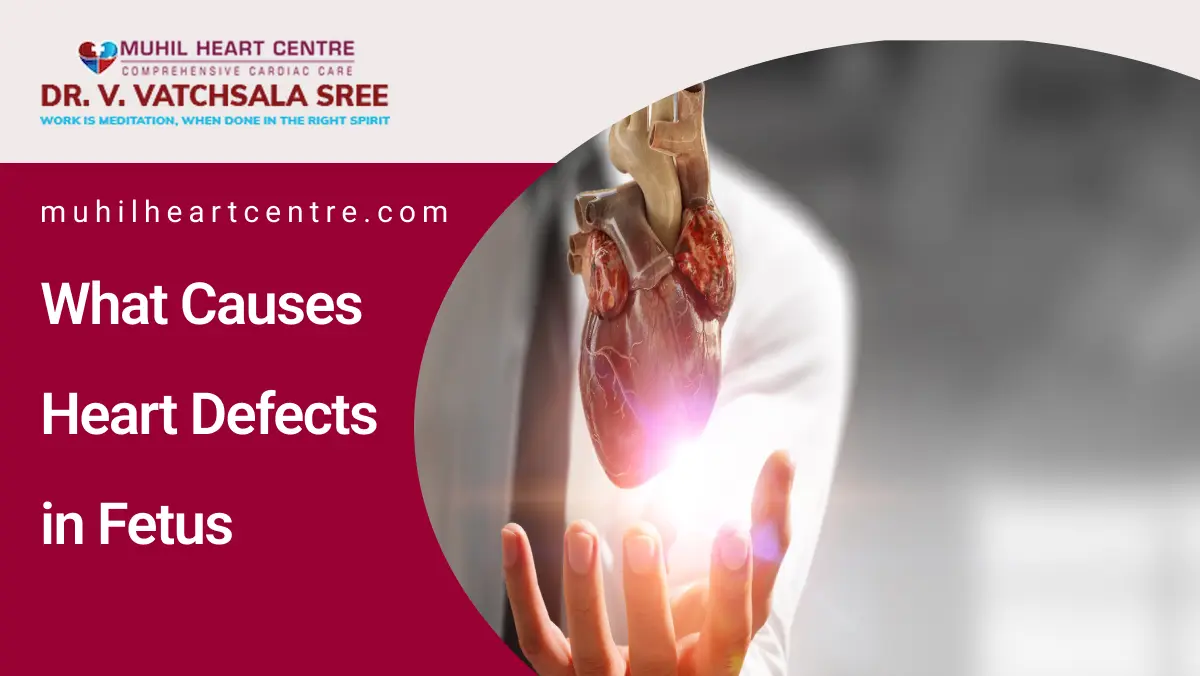The anticipation of a new life brings immense joy, yet it can also raise concerns about potential health complications. One such concern is fetal heart defects. Understanding what causes heart defects in a fetus is crucial for expectant parents and healthcare professionals alike. This comprehensive guide will delve into the various factors contributing to these conditions, exploring the question of what causes heart defects in Fetus.
What Causes Heart Defects in Fetus
Genetic Factors:
- Inherited Genetic Anomalies: Some heart defects stem from genetic mutations passed down from parents, contributing to the question of what causes heart defects in Fetus. Conditions like Down syndrome and Turner syndrome are associated with an increased risk of fetal heart defects.
- Spontaneous Mutations: Occasionally, genetic mutations occur spontaneously during fetal development, affecting the genes responsible for heart formation. These anomalies may not be linked to familial history but can still impact heart health.
Environmental Influences:
- Exposure to Substances: Environmental factors play a significant role in fetal heart health, potentially contributing to the understanding of what causes heart defects in Fetus. Consumption of substances like alcohol, tobacco, or certain medications during pregnancy can elevate the risk of heart defects.
- Occupational Hazards: Pregnant individuals working in environments with potential hazards, such as chemicals or radiation, need to take extra precautions to minimize the risk of fetal heart anomalies.
Nutritional Deficiencies:
- Folic Acid Deficiency: Inadequate intake of essential nutrients, particularly folic acid, can contribute to heart defects in the fetus, shedding light on what causes heart defects in fetus. Ensuring a well-balanced diet and adhering to prenatal vitamin recommendations can mitigate this risk.
- Healthy Lifestyle Choices: Adopting a healthy lifestyle, including regular exercise and proper nutrition, is crucial for overall fetal development, reducing the likelihood of heart defects.
Maternal Health Conditions:
- Pre-existing Conditions: Maternal health conditions like diabetes, obesity, or poorly managed hypertension can increase the risk of fetal heart defects, contributing to the understanding of what causes heart defects in Fetus. It’s crucial to closely monitor and effectively manage conditions during pregnancy.
- Routine Check-ups: Regular prenatal check-ups help healthcare professionals identify and address any maternal health issues promptly, minimizing potential impacts on fetal heart development.
Infections During Pregnancy:
- Rubella and CMV: Infections contracted during pregnancy, such as rubella or cytomegalovirus (CMV), can heighten the risk of fetal heart defects. Timely vaccination and precautions against infections are essential.
- Prompt Medical Attention: If an infection is suspected, seeking immediate medical attention and following prescribed treatments can significantly reduce the risk of complications.
What Can Cause Heart Defects in Fetus
Maternal Health Conditions
Pre-existing maternal health conditions such as diabetes, obesity, or poorly managed hypertension can elevate the likelihood of fetal heart defects, offering insights into what can cause heart defects in Fetus. Proper management and monitoring of these conditions during pregnancy are essential.
Infections During Pregnancy
Certain infections contracted during pregnancy, like rubella or cytomegalovirus (CMV), can increase the risk of fetal heart defects. Taking preventive measures and seeking timely medical care is vital.
Radiation and Chemical Exposures
Exposure to high levels of radiation or certain chemicals during pregnancy can interfere with fetal heart development, potentially contributing to the understanding of what can cause heart defects in Fetus. Minimizing exposure and following safety guidelines are essential precautions.
What Causes Hole in Heart in Fetus
Understanding Septal Defects
- Atrial Septal Defect (ASD): This condition involves a hole in the wall (septum) between the two upper chambers (atria) of the heart.
- Ventricular Septal Defect (VSD): VSD refers to a hole in the septum between the heart’s lower chambers (ventricles).
Causes of Septal Defects
- Abnormal Fetal Development: During the intricate stages of fetal growth, irregularities may occur in the formation of the heart’s septum, potentially resulting in these holes
- Genetic Predisposition: Certain genetic factors or syndromes might predispose a fetus to septal defects, impacting the heart’s structural development.
Environmental Influences
- Maternal Health Habits: A mother’s lifestyle choices during pregnancy, such as smoking or consuming alcohol, can heighten the risk of septal defects in the developing fetus.
- Exposure to Toxins: Environmental factors, including exposure to harmful substances or certain medications during pregnancy, can contribute to the occurrence of septal defects.
Impact of Other Heart Conditions
- Valvular Abnormalities: Issues with heart valves, which control blood flow within the heart, can indirectly contribute to the development of a hole in the heart, shedding light on “what causes hole in heart in Fetus.”
- Complications from Other Heart Defects: In some cases, other existing heart defects might indirectly lead to the formation of septal holes, disrupting the heart’s normal functioning.
Conclusion
Understanding what causes heart defects in fetus is pivotal in taking preventive measures and seeking appropriate prenatal care. From genetic predispositions to environmental influences, various factors can impact fetal heart development. Expectant parents should prioritize healthy lifestyle choices and regular prenatal check-ups to minimize risks.

